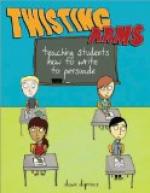Donald’s more strenuous times were in the boys’ holidays—those tumultuous of seasons so well known to the members of all big families! His eldest brother, Hugh, was bent on making an all-round athlete of him; another brother saw in him an embryo county cricketer, while a third was most particular about his music, giving him lessons on the violoncello with clockwork regularity. The games were terribly thrilling and dangerous, especially when the schoolroom was turned into a miniature battlefield, with opposing armies of tiny lead soldiers. But Donald never turned a hair if Hugh were present, even at the most terrific explosions of gun-powder. His confidence in Hugh was complete. Nor did he mind personal injuries. When on one occasion he was hurled against the sharp edge of a chair, cutting his head open badly, and his mother came to the rescue with indignation, sympathy and bandages, whilst accepting the latter he deprecated the two former, explaining apologetically, “It’s only because my head’s so big.”
He admitted in after years to having felt most terribly swamped by the personalities of two of his brothers. The third he had more in common with, for he was more peace-loving, and he seemed to have more time to listen to the small boy’s confidences and stories, which Donald started to write at the age of six.
Hugh, however, was his hero—a kind of demi-god. And truly there was something Greek about the boy—in his singular beauty of person, coupled with his brilliant mental equipment, and above all in the nothing less than Spartan methods with which, in spite of a highly sensitive temperament, he set himself to overcome his handicap of a naturally delicate physique and a bad head for heights. He turned himself out quite an athlete, and actually cured his bad head by a course of walking on giddy heights, preferably roofs—the parapet of the tall four-storied house the children lived in being a favourite training ground.
Donald was the apple of his eye, and he was quick to note a certain lack of vitality about the little boy—especially when he was growing fast—and a certain natural timidity. His letters from school are full of messages to and instructions concerning Donald’s physical training, and from Sandhurst he would long to “run over and see after his boxing.” He called him Don Diego, a name that suited the rather stately little fellow, and he used to fear sometimes that Donald was “getting too polite” and say he must “knock it out of him in the holidays.” Needless to say, his handling of him was always very gentle.
The other over-vital brother, if a prime amuser, was also a prime tease, and being nearer Donald in age was also much less gentle.
Before very long these great personages took themselves off “zum neuen taten.” But their Odysseys came home in the shape of letters, which, with their descriptions of strange countries and peoples and records of adventures—often the realization of boyish dreams—and also of difficulties overcome, were well calculated to appeal to Donald’s childish imagination, and to increase his admiration for the writers—and also his feeling of impotence, and of the impossibility of being able to follow in the tracks of such giants among men!




